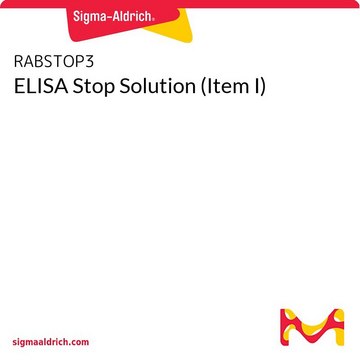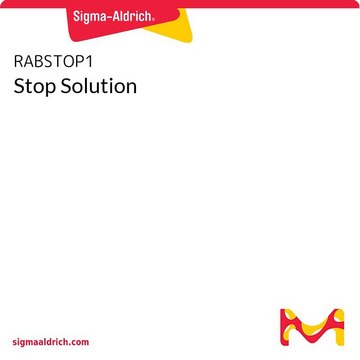S5814
Stop Reagent for TMB Substrate
chromogenic, powder
Synonym(s):
TMB liquid substrate system stop reagent
Sign Into View Organizational & Contract Pricing
All Photos(1)
About This Item
UNSPSC Code:
12352204
NACRES:
NA.83
Recommended Products
Product Name
Stop Reagent for TMB Substrate, powder, ELISA, 450 nm
form
powder
storage temp.
room temp
General description
Stop Reagent for TMB Substrate is used to stop TMB substrate reaction for ELISA and change the absorbance from blue (620 nm) to yellow (450 nm).
Application
Stop Reagent for TMB Substrate has been used:
- for in vitro preparation and analysis of neutrophil extracellular traps (NETs)
- for direct binding enzyme linked immune sorbent assay (ELISA)
- for interference assay
Signal Word
Danger
Hazard Statements
Precautionary Statements
Hazard Classifications
Acute Tox. 4 Dermal - Acute Tox. 4 Oral - Eye Dam. 1 - Skin Corr. 1 - Skin Sens. 1 - STOT SE 3
Target Organs
Respiratory system
Storage Class Code
8A - Combustible corrosive hazardous materials
WGK
WGK 3
Flash Point(F)
260.6 °F - closed cup
Flash Point(C)
127 °C - closed cup
Choose from one of the most recent versions:
Already Own This Product?
Find documentation for the products that you have recently purchased in the Document Library.
Customers Also Viewed
Development of a reliable assay to measure glypican-1 in plasma and serum reveals circulating glypican-1 as a novel prostate cancer biomarker
Levin RA, et al.
Oncotarget, 9(32), 22359-22359 (2018)
Romesh R Subramanian et al.
Nucleic acids research, 43(19), 9123-9132 (2015-10-09)
The in vivo potency of antisense oligonucleotides (ASO) has been significantly increased by reducing their length to 8-15 nucleotides and by the incorporation of high affinity RNA binders such as 2', 4'-bridged nucleic acids (also known as locked nucleic acid
Prevalence of interfering antibodies in dogs and cats evaluated using a species-independent assay
Bergman D, et al.
Veterinary Clinical Pathology / American Society For Veterinary Clinical Pathology, 47(2), 205-212 (2018)
Myeloid-specific deletion of peptidylarginine deiminase 4 (PAD4) mitigates atherosclerosis.
Liu Y, et al.
Frontiers in Immunology, 9, 1680-1680 (2018)
Fresthel Monica M Climacosa et al.
Protein and peptide letters, 27(10), 962-970 (2020-04-29)
Microbe-Binding Peptides (MBPs) are currently being investigated to address the problem of antimicrobial resistance. Strategies enhancing their antimicrobial activity have been developed, including peptide dimerization. Here, we present an alternative approach based on peptide polymerization, yielding hapten-labelled polymeric MBPs that
Our team of scientists has experience in all areas of research including Life Science, Material Science, Chemical Synthesis, Chromatography, Analytical and many others.
Contact Technical Service







